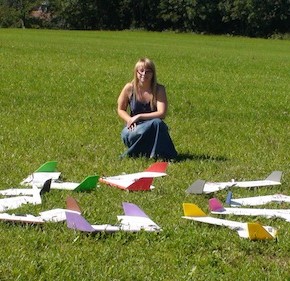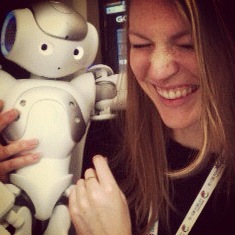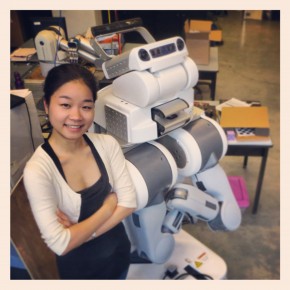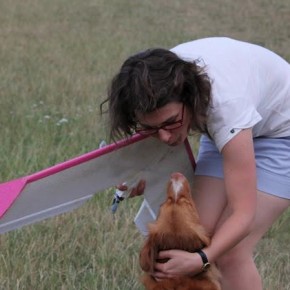
Robohub.org
Why we didn’t plan for Women’s Day
International Women’s Day crept up this year, and no one on our team planned for it. As it turned out, we didn’t need to. Making STEM fields attractive for women, giving them a voice, and helping them reach the highest ranks of academia and business is our everyday job.
As a pure coincidence, Robohub’s main news pieces today include a thought provoking all-women podcast episode about giving rights to robots, and a news piece prepared by an all-girls FIRST team. Over the years, through our efforts at the ROBOTS Association, we have interviewed many amazing women — not because they are women — but because they are at the frontiers of their field. You might want to check out recent posts with Radhika Nagpal, Jamie Paik, Mary-Anne Williams, Erin Rapacki, Andra Keay, Maarja Kruusmaa and Diana Saarva. Nearly half of our own Robohub team is powered by women. Our 12 Robohub Gals are students and experts in law, startups, research and science communication, and span 5 countries.
We can do better, however. Our Robotics By Invitation panel for example, doesn’t yet include enough women. News and interviews that feature women in robotics are still rare and far apart, and the number of women that make it to the top of the field is currently low. There are many parts of the world where it is still impossible for women to get an education, let alone become roboticists.

I’m an eternal optimist. I studied Computer Science, did a PhD in Aerial Swarm Robotics and am now doing a postdoc in Nanomedicine at MIT. I love my job, which involves crowdsourcing the design of swarming nanoparticles to treat cancer. Sounds cool right? The lab where I work is lead by a wonderful female professor and many of the women who work there are mothers with successful careers. It’s not easy, but the doors are opening. I’ve personally never seen one close just because I am a woman.
Below some of the Robohub Gals tell us why they got into robotics and why their job is so cool. We hope this inspires current and future generations to go through these open doors, and to keep pushing against those that are still closed. We shouldn’t be doing the pushing alone — and we aren’t, thanks to all the guys out there helping.
Let’s make this a year-long effort.

From Kate Darling
When I was a little girl, I read all of the science fiction novels my dad had lying around the house. I think that’s what opened my mind to concepts of technology shaping and changing society, and trying to think ahead. Right now I’m particularly fascinated by the ways we’re beginning to interact with robots on a social level. Does this differ in any meaningful way from our interactions with other objects? And if yes, are there social, ethical, or even legal implications we need to consider?
 From Andra Keay
From Andra Keay
Why isn’t my mother a mechanic? As a child, my mother had her own overalls. She grew up stripping engines and cleaning carburettors. She was the daughter of a mechanic and master builder. Then she became a librarian. As a child, I wanted to be an astronaut. I grew up playing with punch cards and radio telescopes. My father was a physicist and astronomer. I built rockets, robots, computers and oscilloscopes with him. Then I became a film maker. Eventually I returned to the study of rockets and robots but from the perspective of trying to understand why our sciences seemed to be gendered and what happens at the intersections of society and technology. Read Andra’s full post.

From Ajung Moon
When I was about ten years old my father brought home a 386 model computer. Having a computer at home was a big deal back then and I instantly fell in love with it. Soon, I learned that computers and programming languages are like magic wands you can use to make your ideas a reality on a computer screen. I eventually got my undergraduate degree in Mechatronics engineering to get a new set of wands I can use to make things happen outside computer screens. Now I am working on making robots move and interact with people in ways that are not only useful and human-friendly, but also designed with societal, legal, and ethical issues of robotics in mind. Because with great power comes great responsibility.

From Maja Varga
Since I was a kid, I was amazed by group behaviors of animals. I was always asking myself, how can birds flock together so perfectly synchronized, how can these tiny ants carry a big chunk of bread together, how do these intelligent species perceive their environment. Since I was more interested in engineering sciences than biology, it was natural for me to decide to do the research in a bio-inspired robotics. My research focus is oriented on collaboration between flying robots, humans and dogs in search and rescue missions. I am trying to develop adaptation mechanisms to allow flying robots to work together with human rescuers and even to establish interaction with dogs to attract their attention and guide them in a search mission.
Finally, I wanted to thank Hallie for her help in preparing this post. I hope you all join the discussion in the comment section below!
tags: opinion, women in robotics




